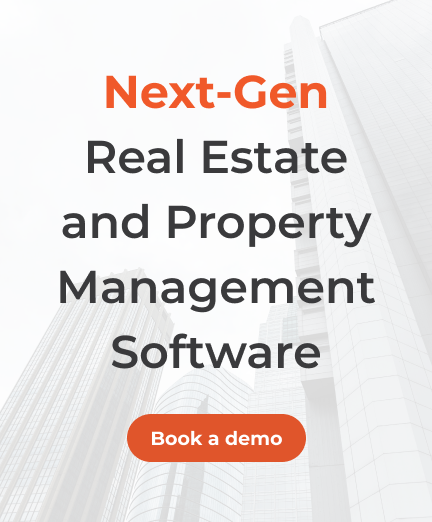Introduction
Broker management software is quickly becoming a must-have for brokers and agents in real estate businesses, helping them to be more efficient and competitive. Every day, you’re handling listings, chasing clients, tracking commissions, and ensuring all compliance boxes are checked. It’s a lot. And without the right tools, it’s even harder. More brokerage firms are going digital and realizing how much it benefits their business.
In this blog post, we’ll walk you through everything you need to know about broker management software - what it is, who uses it, how it works, and why it's becoming a must-have for modern real estate brokers or agents. We’ll explore its core features and the key benefits it offers, its types, and factors to consider while choosing the right solution for your business. So let’s get started.
What is Broker Management Software?
BMS brings everything a broker needs into one smart platform. You can manage leads, property listings, agent activities, client interactions, deals, and commissions, all from a single dashboard. It also takes care of many mundane tasks like sending reminders, updating listing info, or generating transaction reports, and helps you focus on closing deals and keeping your clients happy.
The Rise and Market Demand for Broker Management Software
Today’s real estate market looks nothing like it did a few years ago, and broker management software is proving to be a vital part of that evolution. The numbers back it up. The real estate brokerage software market was valued at $2.78 billion in 2024 and is expected to reach $5.92 billion by 2033, growing at a rate of 9.1%. But what’s driving this growth? Let’s break it down.
Increasing Digital Transformation
Digital transformation is happening all across the real estate world. Brokers aren’t relying on paper files and manual spreadsheets anymore. They want tools that help them work smarter, faster, and more accurately, and that’s exactly what broker management software offers.
Online Property Transaction
Today’s clients are more comfortable searching for, viewing, and even buying properties online than ever. To keep up, brokerages need platforms that can handle online listings, leads, and deals, all in one place.
Rise of Mobile Apps
Another big shift? The rise of mobile apps. Agents are constantly on the move, whether it’s meeting clients or touring properties. Having mobile access to listings, client data, and transactions lets them work from anywhere.
Growing Demands for AI and Data Analytics Tools
Brokerages want more than just basic record-keeping. They want smart insights. Things like predicting client behavior, tracking the best-performing agents, and spotting market trends have become major growth strategies.
Adoption of Cloud Technology
Cloud technology has made broker management software more flexible and affordable than ever. Cloud platforms allow businesses to scale easily, support remote teams, and cut down on expensive IT costs, along with keeping data secure and accessible from anywhere.
Who Uses Broker Management Software in Real Estate Businesses?
Broker management software isn’t just for brokers, even though the name makes it sound that way. It’s used by all kinds of professionals across the real estate world. Let’s find out who benefits from it.
Residential Brokerage
Real estate brokers, property managers, leasing agents, HOAs, and tenant relationship managers are among the most active users of BMS. It helps residential brokers manage daily operations with fewer errors and faster responses.
Commercial Brokerage
Commercial brokerages work with much larger and often more complex deals. In the commercial space, BMS helps retail brokers, office leasing agents, coworking space managers, commercial property managers, and shopping mall administrators to handle property marketing, rental negotiations, tenant onboarding, and contract management.
Property Developers
For property developers, BMS is the control center for sales and leasing activities. Project managers, leasing managers, sales managers, and client relationship managers all rely on it to organize unit sales, track buyer inquiries, manage contracts, and ensure smooth handovers.
Real Estate Brokerage and Agency Firms
In brokerage and agency firms, leasing managers, property managers, tenant coordinators, operations managers, and contract managers use BMS. These firms handle several listings at once. Without a system to centralize lead management, contract tracking, and agent performance, operations can easily go chaotic.
Types of Broker Management Software
Different businesses have different needs, and luckily, there are options to match. Broadly speaking, you’ll find two main types of BMS: on-premises and cloud-based solutions.
On-Premise BMS
On-premises software is exactly what it sounds like: it's installed and hosted on your company’s servers. You buy the software, set it up on your computers, and maintain it yourself.
This type of system gives you a lot of control. You can customize it heavily, manage your own security protocols, and make sure sensitive data stays completely in-house. That’s a big win if you’re working with high-value clients or commercial deals where confidentiality is non-negotiable.
But on-premises software comes with some extra responsibilities. You'll need a reliable IT team to handle updates and troubleshoot issues. Scaling up can be slow and expensive because it often means buying more hardware or licenses.
Cloud-Based BMS
Cloud-based software, on the other hand, lives online. Instead of hosting it yourself, you access it through a secure web portal. It’s faster to deploy, easier to update, and way more flexible if you have remote teams or agents working in the field.
Another big advantage is its lower upfront costs. Most cloud solutions run on a subscription model, so you pay monthly or annually based on what you need. And since the provider handles security, backups, and updates, you don’t need a huge IT department to keep things running.
Whether you go with on-premises or move to the cloud, the real value comes from what the software can actually do for you.
Key Features of Broker Management Software
If you’re thinking about investing in broker management software or upgrading what you already have, you’ll want to make sure it’s packed with the right tools. The features you should look for are;
Property CRM
It should have advanced filters that narrow down options by location, price, or type. You can track and organize potential clients, monitor prospects, and manage sales opportunities. It helps you create quick lease agreements and generate professional quotes or proposals.
Lead Management and Automation
You can capture, track, and nurture leads automatically, ensuring no potential client slips through the cracks. Automation features help you prioritize leads and follow up at just the right time.
Contract and Agreement Management
Managing contracts gets a whole lot easier with built-in tools that track agreements. You can handle renewals, terminations, and amendments without losing sight of important changes.
Inspection Management
Streamline tenant onboarding and move-out processes with efficient inspection management. Easily schedule and manage property tours, ensuring smooth transitions for both tenants and property managers.
Account Receivable
It lets you manage invoicing, payments, and financial tracking with automated invoice creation and easy recording of custom transactions. Keep track of payments and settlements, streamline credit adjustments, and simplify refund and final payment processes.
Integration Capabilities
It should integrate well with accounting systems, CRM platforms, payment gateways, and more, helping you build a complete ecosystem without switching between platforms.
Communication and KYC
Manage legal case tracking and all your critical contact information. Easily display promotional content, gather client feedback, and run surveys to better understand your market. Streamline team discussions, organize important documents, and handle KYC screening requests.
Advanced Planning Tools
You can track daily activities, share real-time updates and notifications, and manage team schedules. It lets you plan tasks, monitor staff availability, and assign responsibilities, making sure everyone knows what to do and when.
Transaction Management
You can track transactions, manage all necessary documents, and ensure that sales and lease processes are completed on time.
Team Management Tools
Provide you with the tools to clearly define your company’s hierarchy, departments, and roles. You can manage registered workers, send invitations to new team members, and configure tax groups and related financial items.
Accounts and Contacts
It lets you maintain detailed records of customers, vendors, property owners, and agents. You can also manage profiles for brokers and service providers.
Listing Management
It lets you organize listings with detailed information, update availability in real-time, and quickly match properties to client needs.
Reporting and Analytics
Generate customized reports, monitor performance metrics, and gain insights into sales trends, agent productivity, and overall brokerage growth.
Benefits of Using Broker Management Software
When you're managing properties and clients every day, keeping everything organized can feel like a full-time job on its own. BMS makes your entire brokerage smarter and way more efficient with the following benefits;
Complete Automation of Property Brokerage - No more manual work
The software handles day-to-day operations without constant manual input. It helps you grow your business faster by cutting down on boring admin work and helping you get more done.
Improved Client Relationship – Build trust that lasts
With BMS, it’s easier to keep track of your clients. You can respond faster, store all their info in one place, and never miss a follow-up. This helps you build stronger relationships and keep your clients happy.
Optimize Financial Tracking – Smarter money management
Real-time financial dashboards and automated payment records mean you always know where your money is. No need to chase down transactions manually. Income, commissions, and expenses are all tracked accurately, minimizing errors and missed payments.
360⁰ Business Overview – Complete visibility
One of the biggest advantages is that you get complete control over your business. From deal pipelines to agent activities to finance, everything is tracked and updated in real time, helping you manage growth strategically with a clear, data-backed view of the business.
Enhanced Property Management – Handle units without the mess
Whether managing residential units or commercial spaces, it keeps property details, contracts, inspection reports, and tenant histories centralized. This ensures easier access to information and better control over active listings and rentals.
Gain Actionable Insights – Better and faster decisions
Instead of raw data that’s hard to process, the software offers ready-to-use reports and dashboards. It helps you make smarter decisions, like identifying profitable property types, spotting market trends, and optimizing agent performance.
Improved Communication and Collaboration – Everyone is on the same page
Built-in messaging tools, shared calendars, and centralized documentation keep agents, managers, and clients aligned. Team collaboration improves, and project timelines move faster without miscommunication or data loss.
Cost Saving – Better ROI
By reducing paperwork, manual errors, and duplicated efforts, BMS significantly lowers operational costs. Agencies can run leaner teams while maintaining high levels of service and can avoid extra expenses linked to inefficiencies.
How do you choose the right broker management software for your business?
Picking the best broker management software isn’t just about grabbing the flashiest tool out there. It’s about finding a system that matches your business needs and fits your team’s workflow. Here’s what you should keep in mind;
Know Your Goal
Be clear on what you want to achieve. Are you looking to organize your listings? Improve client communication? Speed up transactions? Knowing your main goal will narrow down your choices and save you a ton of time.
Key Features to Look For
Make sure the software covers features like;
- Customer relationship management (CRM)
- Transaction management
- Commission tracking
- Marketing automation
- Strong reporting tools.
Integration Capabilities
The software should integrate well with your other tools, like accounting software, CRM, marketing platforms, etc. Smooth integration means less manual work and better data flow.
User-Friendly Interface
The last thing you need is a complicated system that your team hates using. Pick software that’s simple to use and easy to understand, so that you can figure it out without needing a tech expert.
Customization Options
Every brokerage is a little different. Software that lets you customize workflows, templates, and dashboards will fit your processes better.
Scalability
Choose a platform that can grow with you, whether you're adding more agents, expanding to new locations, or handling more transactions. Scalability ensures that you don’t have to switch to a new system later.
Mobile Accessibility
It should offer mobile apps or responsive web access so you can manage leads, properties, and deals anytime, anywhere.
Data Security
Sensitive client information, contracts, and financial details need to be protected. Make sure the software has strong security measures like data hosting, encryption, two-factor authentication, and regular backups.
Customer Support and Training
No matter how good the software is, questions and issues are bound to come up. That’s why strong customer support and thorough training matter. You want a team that responds quickly, clear resources that guide you, and onboarding help that makes the transition easier.
Cost
Consider both upfront costs and any ongoing subscription fees. Make sure the software fits your budget and gives you the features that are useful for your business.
Vendor Reputation
Read user reviews, check case studies, and see how long the vendor has been in business. A solid reputation often means the company will continue to improve the product and support you when needed.
Opportunities and Challenges in the Broker Management Software Market
The broker management software market is growing fast, but it’s not without its twists and turns. As real estate businesses rush to embrace new technology, fresh opportunities are opening up, while a few hurdles still need careful navigating.
Market Opportunities
Growing Digital Transformation in Real Estate
The real estate sector is rapidly adopting digitalization. Broker management software that improves efficiency is increasingly in demand.
Integration of AI and Machine Learning
AI and ML are reshaping how brokers work today. From predicting market trends to helping agents personalize client interactions, smart software is giving firms a serious competitive edge.
Adoption of Cloud-Based Solutions
Cloud-based platforms offer flexibility, scalability, and affordability. They're also lighter on the budget compared to heavy, on-premise setups.
Demand for Remote Collaboration Tools
Work isn’t tied to a desk anymore. Brokers, agents, and clients want to stay connected no matter where they are. BMS that supports mobile access, remote document sharing, and real-time communication is in high demand.
VR and AR Technologies
Virtual reality and augmented reality are completely transforming property tours. Clients can now "walk through" properties from their living rooms, which is a big win for international buyers or during times when travel isn’t possible.
Growing Interest in Sustainability
Green building standards are becoming more important in the real estate industry. Modern solutions are stepping up by offering tools that help monitor energy usage, track sustainability efforts, and meet compliance goals.
Market Challenges
High Competition
The BMS market is packed with vendors offering similar tools. Standing out takes more than just good features. You need strong value, clear messaging, and real results to grab market share.
Security Risks
Real estate transactions involve sensitive client data. Without strong cybersecurity measures, you could damage your reputation and business. Software providers must prioritize airtight data protection.
Rapid Technological Advancement
Technology is moving fast, and what’s advanced today might feel outdated tomorrow. Vendors have to keep up by regularly updating their platforms and adding new features.
Resistance to Change within an Organization
Switching to new software isn’t always easy. Some teams prefer sticking to manual processes because that’s what they know. Good training programs and solid change management strategies are key to overcoming this.
Integration with Various Data Sources
Connecting BMS to systems like MLS databases can be tricky. If not handled properly, it can lead to data mismatches or missing information, which disrupts operations and causes frustration.
Most Importantly…
If you’re in real estate, it’s worth taking a step back to ask: are your current tools helping you close deals faster, keep clients happy, and provide complete clarity of your business performance? Getting the right software isn’t just about saving time. It helps you run things better and close deals faster. But great software also needs a great team behind it. That’s why picking a reliable partner really matters. They’ll guide you, support you, and make sure your operations run smoothly. Want to see how it works? Try a free demo or book a call with a reputed vendor today. It could just be the smartest move you make this year.
Source: verifiedmarketreports.com





